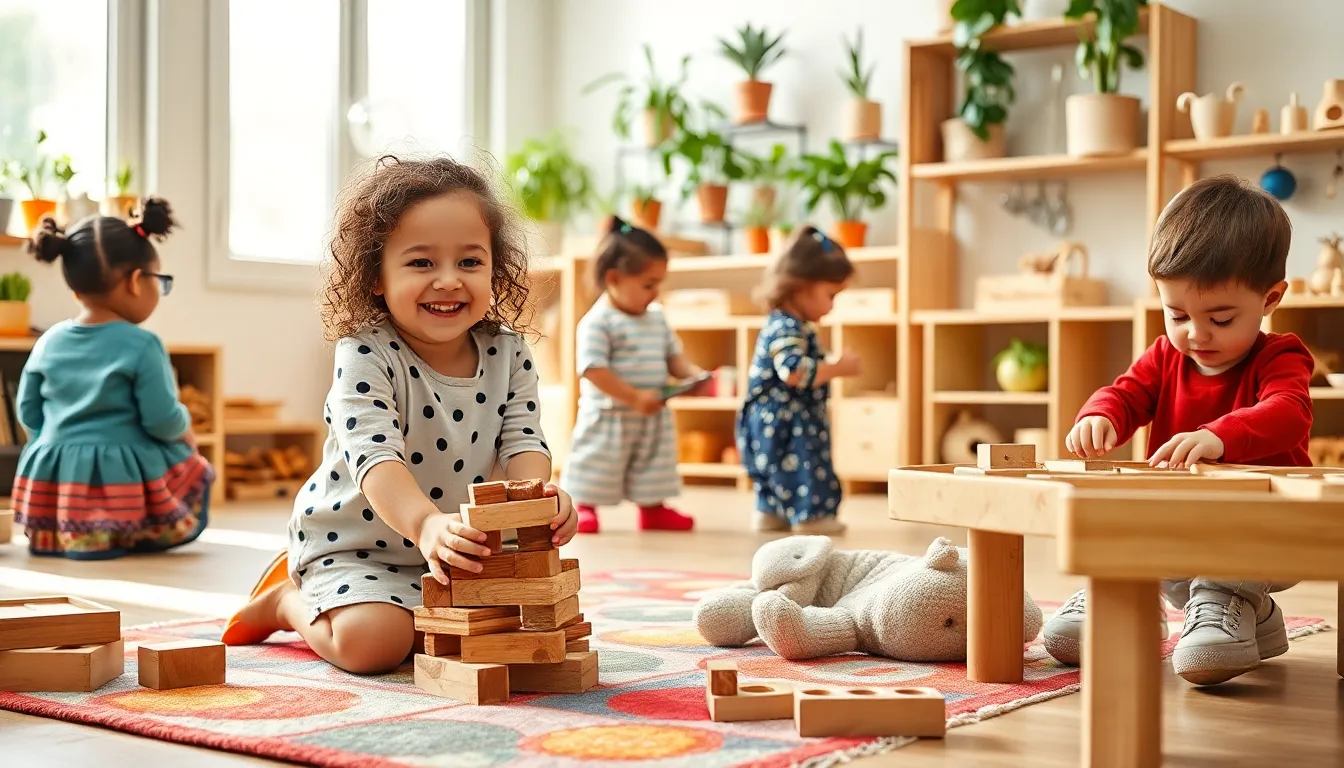Montessori education has transformed the way we view childhood learning and effort. This child-centered approach encourages independence and fosters a love for learning from an early age. By allowing children to explore their interests at their own pace, Montessori cultivates intrinsic motivation and a sense of responsibility.
In this nurturing environment, children engage in hands-on activities that promote critical thinking and problem-solving. The emphasis on effort over perfection empowers them to embrace challenges and develop resilience. As they navigate their educational journey, they learn that effort is not just a means to an end but a valuable part of the learning process itself. Understanding the connection between Montessori principles and childhood effort reveals the profound impact this method can have on a child’s development.
Table of Contents
ToggleUnderstanding Montessori Education
Montessori education centers on a child’s natural development and their intrinsic motivation. This approach emphasizes independent learning and personal exploration, fostering a lifelong love for education.
Key Principles of Montessori
- Child-Centered Learning: Montessori education prioritizes the individual learning styles and interests of each child, allowing them to drive their own learning experiences.
- Hands-On Activities: These tangible experiences provide children with practical skills and real-world applications, enabling them to understand complex concepts.
- Mixed Age Groups: By incorporating children of various ages, Montessori classrooms promote peer learning and social development, enhancing collaborative skills.
- Self-Directed Work: Children choose their activities, promoting autonomy and decision-making skills while encouraging responsibility for their own learning.
- Respect for the Child: This principle fosters a supportive and nurturing environment, where children’s choices and efforts are valued and encouraged.
The Role of the Environment
- Prepared Environment: Montessori classrooms feature carefully arranged learning materials that inspire curiosity and accommodate independent exploration.
- Freedom of Movement: Children are encouraged to move freely within the learning space, which supports their natural development and energy levels.
- Access to Materials: All learning tools are within reach, promoting independence and allowing children to learn at their own pace.
- Calm Atmosphere: A serene environment reduces distractions and fosters concentration, essential for effective learning.
- Natural Elements: Incorporating nature through plants and outdoor activities connects children with their surroundings and enhances their sensory experiences.
Childhood Effort in Montessori


Montessori education emphasizes childhood effort as a pathway to growth. Through carefully structured environments and activities, children engage actively in their learning processes.
Encouraging Independence
Montessori promotes independence by allowing children to make choices in their learning. Students select activities that interest them, fostering self-direction. This autonomy builds confidence as they learn to manage their time and tasks effectively. Practical life activities, such as pouring, buttoning, and sweeping, enhance fine motor skills and instill a sense of accomplishment. By encouraging children to take ownership of their learning, Montessori nurtures the ability to solve problems independently.
Developing Concentration
Montessori environments support concentration through structured yet flexible activities. Children engage in hands-on tasks that captivate their interest, allowing deeper focus. Materials are designed for self-correction, promoting persistence as they work through challenges. Regular periods of uninterrupted work time help cultivate sustained attention and promote a sense of achievement. This concentration leads to improved discipline and cognitive development, essential skills for lifelong learning.
Benefits of Montessori Method
The Montessori method significantly benefits children’s development by fostering a love for learning and building essential life skills. These outcomes play a crucial role in shaping well-rounded individuals.
Fostering a Love for Learning
Montessori education cultivates a love for learning through an engaging and exploratory approach. Children choose activities that align with their interests, which deepens their engagement and motivation. By encouraging self-directed exploration, this method allows for a personalized learning experience, making learning enjoyable rather than a chore. Additionally, the prepared environment enhances curiosity and creativity, resulting in passionate learners who approach challenges with enthusiasm. Studies show that children in Montessori settings display more positive attitudes toward learning and exhibit greater persistence in their work.
Building Life Skills
Montessori education emphasizes the development of practical life skills essential for independence and personal growth. Through various hands-on activities, children learn skills such as pouring, sweeping, and gardening, which promote fine motor development and coordination. These tasks build confidence and a sense of achievement. Moreover, as children navigate their learning environments, they enhance decision-making and problem-solving abilities. The mixed-age classrooms encourage cooperation and communication, further solidifying teamwork and social skills. Overall, Montessori nurtures a well-rounded skill set crucial for both academic success and daily life.
Challenges and Considerations
Montessori education presents various challenges and considerations. Understanding these aspects is crucial for effective implementation.
Misconceptions about Montessori
Many misconceptions surround Montessori education. People often believe it lacks structure, equating freedom with chaos. In reality, Montessori classrooms provide carefully designed environments that promote autonomy while maintaining order. Others think Montessori is only suitable for young children, but it effectively supports learners from infancy to adolescence. Additionally, some perceive Montessori as a “fluffy” approach, overlooking its emphasis on rigorous academic standards and critical thinking skills.
Adapting to Individual Needs
Adapting Montessori principles to individual needs can be challenging. Each child’s unique learning style and pace require tailored approaches. Teachers must assess and adjust lessons to match students’ abilities and interests. Mixed-age groups offer peer learning opportunities, but this dynamic can complicate curriculum planning. Training educators to recognize and respond to diverse needs enhances the learning experience. Furthermore, balance between freedom and guidance is essential, ensuring children receive support without stifling independence.
Montessori education profoundly shapes childhood development by nurturing independence and a genuine love for learning. Its emphasis on effort over perfection cultivates resilience and a willingness to embrace challenges. By allowing children to explore their interests in a prepared environment, they engage deeply and develop essential life skills.
This approach not only fosters critical thinking and problem-solving abilities but also instills confidence and autonomy. As children learn to make choices and navigate their educational journey, they become well-rounded individuals ready to face future challenges. Ultimately, the Montessori method equips children with the tools they need for lifelong success both academically and in daily life.



